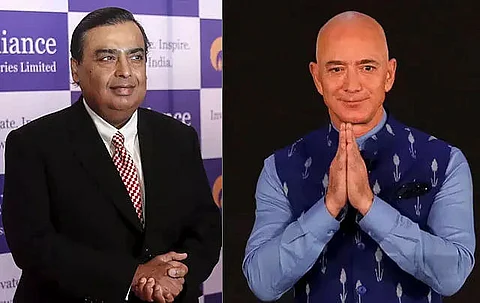
- Home
- Live Blog
- Breaking News
- Top Headlines
- Cities
- NE News
- Sentinel Media
- Sports
- Education
- Jobs

NEW DELHI: In the Jeff Bezos vs Mukesh Ambani battle royale for
the Indian retail market, which is now also evolving into a 'Videshi vs
Swadeshi' battle, questions are being raised by corporate watchers.
Eight absolutely unknown facts are emerging in the Bezos vs Ambani battle.
1. Has Amazon's Jeff Bezos disclosed all of the Amazon-Future agreements to Future Retail Ltd (FRL) shareholders?
To this, corporate watchers say no. Bezos has invested 49 per cent in Future Coupons Ltd (FCL), a promoter company of FRL. 51 per cent of FCL is held by Kishore Biyani, an Indian resident. FCL, in turn, has 9.82 per cent holding in FRL.
It looks as though that FCL is controlled by Biyani with his holding of 51 per cent. This is a requirement under India's FDI Regulations.
Bezos cannot hold directly even one share in FRL. On the face of it, he seems to be in compliance with FDI Regulations. But, the reality is different.
In a two-tier structure, Bezos has taken control of FRL, which is prohibited under FDI Regulations:
(i) Tier 1 is a shareholders' agreement between FRL, FCL and other promoters of FRL. In terms of this agreement, without FCL's consent, FRL cannot transfer its assets or business to any third party and its board cannot even consider such a proposal.
(ii) Tier 2 is a shareholders' agreement between FCL, Amazon and other promoters of FRL. In terms of this agreement, Bezos has taken over the rights of FCL under the FRL shareholders' agreement.
(iii) Thus, effectively Bezos controls FRL.
The Future Retail shareholders agreement and the Future Coupons shareholders agreement have never been disclosed to any Indian regulator.
If they are disclosed:
(i) SEBI will find that Bezos has taken control of FRL and will mandate him to make an open offer at a price of Rs 500 per share.
(ii) ED will find that Bezos has invested in and taken control of a multi-brand retail company without Government approval and hoodwinked the Government of India.
2. Has FRL amended its Articles?
Amazon's rights in FCL were carried as part of the amendment to the Articles of FCL.
FRL Articles have not been amended. This is because, had the amendment been proposed to the shareholders disclosing that Amazon will exercise the rights of FCL under FRL shareholders' agreement, the public shareholders would have never approved it.
3. Amazon could not have invested in FRL through FDI route under FDI Policy. Then, how does it have enforceable rights against FRL?
For this, Amazon has gone through the above mired (and convoluted) structure;
FRL is engaged in Multi Brand Retail Trade (MBRT); Foreign Direct Investment (FDI) — up to 51 per cent — in MBRT is allowed only with prior permission of the government, which will also be subject to veracious conditions, including sourcing of materials within India and management control etc.;
Amazon wants to control the multi-brand retail space, but without any of the legal hassles; therefore, in a convoluted manner, it went ahead with the mired illegal structure; if the veil is pierced and the transaction structure is studied in detail, it will be found to be illegal, said corporate watchers.
The fact that Amazon has obtained an interim order from the Emergency Arbitrator injuncting the public company, FRL not to proceed with the scheme, inspite of not having any direct shareholding in FRL, shows that the contractual rights are nothing but "control", in violation of SEBI and FDI Regulations.
Bezos is learnt to have followed a similar investment structure while investing in More Retail; where he invested Rs 4,200 crore;
For FDI violations, the consequence is, apart from annulment of transactions, Bezos is exposed to penalty of up to three times the investment ~Rs 5,630 crore x 3 times = Rs 16,890 crore, sources said.
For violation of SEBI Takeover Regulations, apart from penalty, they may also be liable to be prosecuted.
4. How as a foreign company Amazon asserted control over FRL and its Board? And on FRL shareholders?
The assertion shows that Amazon has violated FDI and SEBI Regulations. If Amazon asserts control, it needs to make an open offer.
5. Amazon is asserting control over FRL. Does it violate FDI policy?
Yes.
6. Have all of the agreements been disclosed to regulators SEBI, ED, etc.?
No, details of transaction selectively provided in an obfuscated manner
The Enforcement Directorate, SEBI, Ministry of Company Affairs, and other authorities etc, must direct Amazon to disclose the agreements and details of actual arrangements in and commence inquiry.
7. What is the crux of the SIAC'd Interim Order?
It records that Amazon's entire investment was for its direct interests in FRL.
8. Is Mukesh Ambani a competitor of Bezos?
Bezos cannot carry on multi-brand retail in India. He can carry on only market-place e-commerce in India. Yet, his Amazon is referring to Ambani's Reliance as its competitor. Reliance can be Amazon's competitor only if the latter is permitted to do MBRT. (IANS)
Also Watch: Kokrajhar: Senior Citizen Missing Since Oct 21